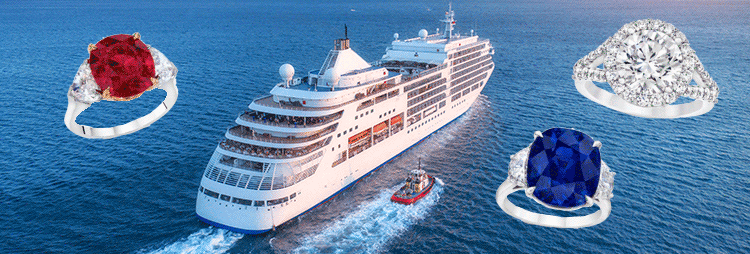President, Eloquence Fine Jewelry
Cruises are popular vacation venues and many people get caught up in the romance of the trip to purchase jewelry – an engagement ring, a necklace to commemorate the occasion, a vacation keepsake. But many get a sinking feeling when they return home and find out that gem they purchased appraises at much lower values than their purchase price or the gem is not the quality, color or clarity they thought. And, good luck getting your money refunded.
What many people don’t know is that the cruise line may have ownership in the jewelry retailers to whom they are referring passengers or, at the very least, they receive payment for their referrals. Some cruise ships even supply coupons.
Just go online and check out the number of complaints by cruisers who purchased items and found out upon their return that the gem isn’t of the quality or type they were told. And, unfortunately, most found out just how air-tight the contracts for purchase they signed are. The bottom line is, if you have to sign a contract that detailed, you should not be purchasing a piece of jewelry. There are many reports online of disillusioned, dissatisfied and unhappy customers. Read the reports for yourself – there are many and some real horror stories.
Having been in the fine jewelry business for more than 30 years, I see my fair share of these former cruisers who bring in their cruise-bought jewelry. It is so disheartening to me to see the looks on customers’ faces when I have to tell them that they did not get what they paid for – and some have paid a lot! One such client paid $13,000 for a piece that was worth $2,500. An older man spent $20,000 on a piece of jewelry during a cruise and, when the company refused to give a refund, he stopped payment on the check. One person bought an engagement ring that appeared yellow and brown with a diamond shaped like an ice cream cone.
In many cases, the grading of the stone is accurate, but the so-called fantasy cuts are not recognized by the Gemological Institute of America. GIA is a nonprofit institute whose mission it is to protect all buyers and sellers of gemstones by setting and maintaining the standards used to evaluate gemstone quality.
And even if you do make contact and try to get a refund, it won’t be easy. The jewelry firms have crafted terminology in their contracts that makes it virtually impossible to do so. The contracts rule out buyer’s remorse as a reason for a refund. Virtually, the only reason they will accept for issuing a refund of any sort is if the buyer has an independent appraisal done within 30 days of purchase and the item appraises at less than was paid. And, signing the contract is mandatory.
The moral of this sad story is, you should never buy jewelry during a cruise unless you’ve done your research first.
- Check out the online reputation of the shop you intend to visit.
- Make sure you’re dealing with a reputable jeweler who is a gemologist.
- Know what type of jewelry you want before you enter a shop. Knowing what you’re looking for will lower the chance of an impulsive, unwanted purchase.
- Make sure you know what a reasonable price is for your desired bauble. This involves a little technical research. You need to make sure you’re comparing the same quality gems.
- Give yourself a budget and stick to it. Don’t spend more than you can comfortably afford.
- Prepare yourself for aggressive salespeople — remember, they want to make a sale. Tell the employee what you’re looking for and what you’re willing to spend. Be firm.
- Read the entire contract very carefully before you sign on that dotted line. Don’t sign anything unless you understand the whole document.

